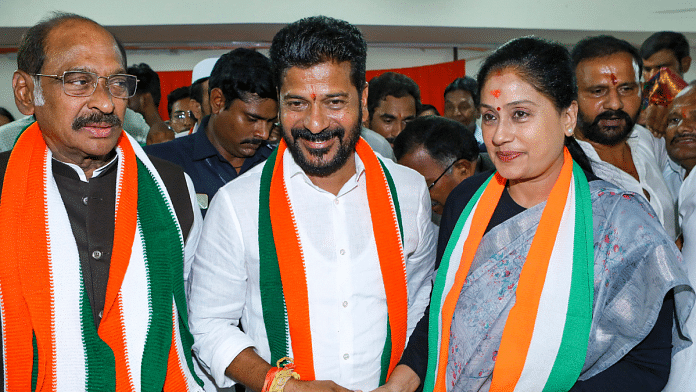Soon after his swearing-in on 7 December 2023, Telangana Chief Minister Revanth Reddy gave his assent to the immediate implementation of the six guarantees promised by the Congress in its election manifesto. For the first time in Indian history, a national party will be transferring welfare scheme amounts directly into the bank accounts of the most poverty-ridden agrarian and artisanal masses.
What is the amount the people of Telangana will receive? The guarantees promised by the Congress include: First, the Mahalakshmi scheme, wherein the Congress government will give women a monthly sum of Rs 2,500, gas cylinders for Rs 500, and free travel in RTC buses. Second, Rythu Bharosa for farmers: Rs 15,000 per acre (both landowners and tenants), Rs 12,000 for agricultural labour, and a bonus of Rs 500 for paddy—all amounts paid annually. Third, the Gruha Jyothi scheme will provide 200 units of free electricity to every household. Fourth is Indiramma Indlu, under which the Congress will give a 250 sq yard plot for all Telangana movement fighters and a house site and Rs 5 lakh for those who do not own a home. Fifth, Yuha Vikasam will give students a Vidya Bharosa card worth Rs 5 lakh while the government will set up Telangana International Schools in every mandal. The last guarantee, Cheyutha, will provide senior citizens with a monthly pension of Rs 4,000 and Rs 10 lakh under the Rajiv Arogyasri insurance.
One clear implication of this agrarian and artisanal welfarism is that a lot of state budget capital will be diverted to rural markets. These schemes do not involve middlemen, nor do MLAs or bureaucrats control the disbursal of amounts. The relevant department will just have to oversee the regular monthly or seasonal transfer of money into the beneficiaries’ bank accounts, which the department will identify after verifying the economic status.
Also read: Rahul Gandhi is reshaping Congress’ welfare agenda. I call it the Shudra Development Model
How the guarantees will benefit
Of course, this kind of money transfer to rich landowners needs to be reviewed in future. But right now, the welfare programmes for the poorest of the poor and working women are seen by economists wedded to the Sangh ideology as “revdis” or freebies. No matter that the Narendra Modi government is opposed to strengthening the country’s agrarian economy, since it is mostly in the hands of Shudra, Dalit, and Adivasi workforces.
Women, especially, will benefit greatly from the initiatives of the Telangana government. The Mahalakshmi scheme will help rural poor women and improve their position within the family through financial assistance. Free bus travel across the state will increase their social exposure, as now, they will be able to travel more to tour the state or simply visit their families and friends. Additionally, women will be able to spend more on themselves, their accommodation, their children’s well-being, food, and clothing. Overall health expenditure will likely come down.
The combined transfers under the Rythu Bharosa, Mahalakshmi, and Cheyutha schemes, including the provision of 10 gm of gold and Rs 1 lakh for women at the time of marriage, will make the Telangana Congress’ initiatives the largest welfare programme in the country.
Many neoliberal economists who support financial assistance to industries and oppose reservation in the private sector in the name of ‘merit’ oppose this kind of agrarian and artisanal welfarism. They argue that such schemes make the agrarian masses lazy. That is absurd. Farming doesn’t suffer due to welfare schemes—farmers don’t stop tilling and harvesting crops just because they are paid a small amount by the government. What will happen, though, is that their health and family well-being will improve, and their respect for and trust in a democratic system will increase.
Also read: Modi’s ‘first OBC PM’ tag is making Rahul Gandhi aspire to be an OBC messiah now
Improving the rural scene
The schemes will positively impact rural markets too, turning them more vibrant. Instead of the big-contract urban mall economy, it will be the rural economy that would be connected to the globalised world. The GST returns from monthly spending by rural families will increase severalfold, which will create a scenario where economic activities will begin to flow within the state. There is no scope for hoarding cash, keeping huge amounts in banks, or transferring money through hawala to foreign countries. From the state budget to rural people, and then from markets back to the state through GST, it will be a smooth process.
Some critics have argued that transferring the money this way will increase alcohol consumption among men. There is no doubt that the danger persists, which is why the money would be transferred to women’s bank accounts, thus reducing the control of men over the received money. Similarly, the amount of Rs 12,000 per year under Rythu Bharosa must also be transferred to the account of the female family member. Moreover, better school and college education—under the Yuva Vikasam scheme—can also have an anti-alcohol effect. A child with an English-medium education at least up to 12th grade in the village would be able to influence the family culture—including a drunkard father.
A democracy must work toward mass welfare in a focused way. The Congress has opened a new chapter with the Karnataka election and enhanced the welfare agenda in Telangana while competing with the Bharat Rashtra Samithi. The BJP opposes such welfare schemes, as it is more inclined toward supporting big businesses and highway economies under the influence of neoliberal Right-wing economists. With this approach, it cannot succeed in the South.
The Congress Telangana package for rural agrarian masses will impact the national welfare discourse.
Kancha Ilaiah Shepherd is a political theorist, social activist, and writer. Views are personal.
(Edited by Humra Laeeq)



